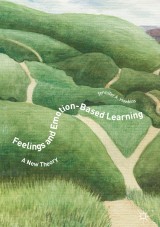Details

Feelings and Emotion-Based Learning
A New Theory|
24,60 € |
|
| Verlag: | Palgrave Macmillan |
| Format: | |
| Veröffentl.: | 20.10.2017 |
| ISBN/EAN: | 9783319660561 |
| Sprache: | englisch |
Dieses eBook enthält ein Wasserzeichen.
Beschreibungen
<div><p>This book explores academic learning theories in relation to modern cognitive research. It suggests that developing a feelings and emotion-based learning theory could improve our understanding of human learning behavior. Jennifer A. Hawkins argues that feelings are rational in individuals' own terms and should be considered—whether or not we agree with them. She examines learners' experiences and posits that feelings and emotions are logical to individuals according to their current beliefs, memories, and knowledge. This volume provides rich case studies and empirical data, and shows that acknowledging feelings during and after learning experiences helps to solve cognitive difficulties and aids motivation and self-reflection. It also demonstrates various ways to record and analyze feelings to provide useful research evidence. </p></div>
1. Introduction<div>2. Learning Theories and Relevance</div><div>3. Towards a Feeling Learning Theory</div><div>4. Mentoring Research: Teachers’ Stories</div><div>5. Teaching Research: School Refusers’ Stories</div><div>6. Evaluation Research: Curriculum Approach Stories</div><div>7. Implications for Education</div><div>8. Feelings Research: Methods and Analysis</div><div>9. General Conclusion</div>
Jennifer A. Hawkins, PhD, is an education researcher at Manchester Metropolitan University, UK.
<div><p>This book explores academic learning theories in relation to modern cognitive research. It suggests that developing a feelings and emotion-based learning theory could improve our understanding of human learning behaviour. Jennifer A. Hawkins argues that feelings are rational in individuals' own terms and should be considered—whether or not we agree with them. She examines learners' experiences and posits that feelings and emotions are logical to individuals according to their current beliefs, memories, and knowledge. This volume provides rich case studies and empirical data and shows that acknowledging feelings during and after learning experiences helps to solve cognitive difficulties, aid motivation and self-reflection. It also demonstrates ways to record and analyse feelings to provide useful research evidence. <br/></p></div>
<p>Draws on practical, nuanced case studies</p><p>Presents a critical overview of the study of emotion and learning</p><p>Paints a picture of a brighter future for the education of young people</p>
Draws on practical, nuanced case studies<div><br/><div>Presents a critical overview of the study of emotion and learning<br/><div><br/><div>Paints a picture of a brighter future for the education of young people<br/></div><div><br/></div><div><br/></div></div></div></div>


















